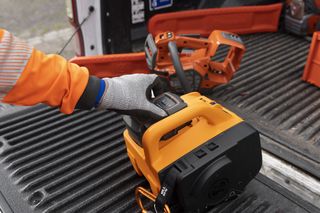
New study identifies a need for education on biodiversity in the UK
Husqvarna recently conducted a survey of 4,000 garden-owners across 8 different countries to find out more about the awareness and behaviours around biodiversity in gardens and outdoor spaces.
Biodiversity concerns grow with a third of brits unaware of meaning and impact
Following the Environment Agency’s recent report on irreversible biodiversity damage, Husqvarna, the pioneer in robotic mowing and smart-garden technology, today reveals that a third (33%) of Brits are unaware of the meaning of ‘biodiversity’, identifying a concerning gap in environmental education in the UK.
The study, which surveyed over 4,000 garden-owners across eight European countries, showcases that familiarity of biodiversity is relatively low in the UK compared to the other markets, with 37% of UK participants acknowledging that they don’t know what actions they could take to make their green space more biodiverse. 41% also admit that biodiversity has a minor or no effect on their choices when planning garden projects, despite ongoing warnings from leading scientists and experts on the impact of biodiversity loss on the planet.
Homeowners need to feel confident in implementing small, simple changes to contribute to biodiversity
When looking at the reasons for minimal action, 15% of Brits believe that factoring biodiversity into their garden is too complicated or too time-consuming, while just over a tenth (11%) said it was due to not having the correct tools for the job. Of all UK residents within the study, 12% confessed that they are not likely to consider biodiversity in the future.
The report identifies a clear need for further education in the UK to reduce barriers and facilitate increased focus on biodiversity, with two-thirds (66%) of respondents saying they would like to learn more about biodiversity and how they can do their bit. During a period of political uncertainty in the UK, 79% see garden-owners as mainly or partly responsible for maintaining biodiversity, compared to only 12% who placed responsibility on the government and politicians and 5% on private companies.
“Our new study identifies a real need for education on biodiversity in the UK as it is more important than ever that homeowners feel confident in implementing small, simple changes in their gardens to contribute to biodiversity” said Patrik Jägenstedt, Director of Technology & Advanced Development at Husqvarna. “This can seem like a daunting or complicated task if this is completely new to you and your garden, but it’s a lot easier than it seems. For example, allowing parts of the lawn to grow at different lengths is a great way to help your local wildlife – it creates a habitat for native plants, bees, and other pollinators.
“Husqvarna has developed several technologies that empower gardeners to support biodiversity. For example, our AIM Technology allows gardeners to design and maintain fully rewilded meadows side-by-side with a perfectly cut lawn and create zones with higher cutting lengths. By consciously making these kinds of changes, collectively we can make a big difference in enabling biodiversity to thrive.”

10 tips to increase biodiversity in your garden
Professor Alexandre Antonelli, professor in biodiversity at the University of Gothenburg and Director of Science at the Royal Botanic Gardens Kew, advises the top ways to help improve biodiversity in your garden.
- Cut your grass with moderation and allow selected areas of your lawn to grow wild.
- Plant and maintain your garden using ecological options. Avoid using artificial pesticides and chemical fertilisers.
- Keep the naturally fallen organic material in your garden such as leaves and twigs - these act as a natural fertiliser to nourish your garden and will increase biodiversity.
- Only cut your lawn during the day in order to avoid nocturnal animals.
- Fill your garden with many different types of plants - from small flowers to large trees - and make sure that you have species that flower through all seasons.
- Become more self-sustainable and utilise the food that the garden produces. If you can’t eat it all - donate!
- Allow weeds in your garden. Many species that are referred to as weeds are important food sources for pollinators as well as habitats for insects.
- Save trees and shrubs. These are important habitats for many different kinds of species!
- Minimise artificial light outside in your garden. These can be disturbing to nocturnal animals and plants.
- Offer species habitats and install birdhouses and insect hotels in your garden.
Husqvarna BioLife
Husqvarna is passionare about encouraging everyone with a garden to consider some of the simple ways they can help cater to the well-being of flora and fauna in their area. To learn more about Husqvarna and our commitment to biodiversity, visit our BioLife page.
| Press Contact |
|---|
Burson |









